

Business Plan Confidentiality Statement
A business plan serves as a comprehensive roadmap that outlines the strategic vision, objectives, and operational framework of a business venture. It encompasses critical details such as market analysis, financial projections, marketing strategies, and operational procedures, providing a comprehensive overview of the business’s objectives and trajectory. In the process of developing a business plan , entrepreneurs often encounter the necessity of safeguarding sensitive and proprietary information, prompting the inclusion of a confidentiality statement within the document. A business plan confidentiality statement is a vital component that underscores the commitment to protecting confidential information and proprietary data, ensuring that the business’s competitive edge and strategic insights remain secure and safeguarded from unauthorized disclosure or misuse.
Purpose and Scope of the Confidentiality Statement
The primary purpose of a business plan confidentiality statement is to establish a legally binding agreement between the business and the intended readers or recipients of the business plan. This agreement emphasizes the confidential nature of the information contained within the business plan and serves as a formal acknowledgment of the recipient’s responsibility to maintain the confidentiality of the proprietary data and insights shared by the business. By clearly defining the scope and parameters of confidentiality, the statement reinforces the business’s commitment to protecting its intellectual property, trade secrets, and strategic business insights from unauthorized access, distribution, or exploitation.
Key Components of a Business Plan Confidentiality Statement
A robust business plan confidentiality statement typically includes the following key components:
- Definition of Confidential Information: Clearly defining the scope of confidential information that is encompassed within the business plan, including proprietary data, financial projections, marketing strategies, operational procedures, and any other sensitive business insights that are not intended for public disclosure.
- Non-Disclosure Commitment: Outlining the recipient’s obligation to maintain strict confidentiality and refrain from disclosing, reproducing, or distributing the confidential information contained within the business plan to any external parties without the prior written consent of the business.
- Limitations on Use: Stipulating the permissible uses of the confidential information solely for the purpose of evaluating the business proposal and facilitating potential business collaborations or investment opportunities, emphasizing the restriction on using the information for personal gain or competitive advantage.
- Duration of Confidentiality: Specifying the duration of the confidentiality agreement, including the timeframe during which the recipient is obligated to maintain the confidentiality of the information, as well as any provisions for the perpetual protection of certain proprietary information beyond the termination of the business relationship.
- Legal Recourse and Remedies: Enumerating the legal remedies and consequences associated with the breach of confidentiality, including potential legal action, financial penalties, and the imposition of injunctive relief to mitigate the unauthorized dissemination or misuse of the confidential information.
- Binding Nature of the Agreement: Expressing the mutual agreement and understanding between the parties involved, highlighting the binding nature of the confidentiality agreement, and underscoring the significance of adhering to ethical business practices and professional integrity throughout the business engagement.
Ensuring Comprehensive Protection of Intellectual Property
By incorporating a well-crafted confidentiality statement within the business plan, entrepreneurs can proactively safeguard their intellectual property, trade secrets, and proprietary business insights, fostering a secure and trustworthy environment for sharing confidential information with potential investors, business partners, or stakeholders. The inclusion of a confidentiality statement not only fortifies the legal protection of sensitive data but also reinforces the business’s commitment to transparency, integrity, and ethical business conduct, fostering a culture of mutual trust and respect within the realm of business collaborations and strategic partnerships.
Examples of Confidentiality Statements For Business Plans
Here are a few examples of business plan confidentiality statements that you can use as references or templates for drafting your own business plan confidentiality agreement:
Simple Business Plan Confidentiality Statement:
“This business plan and the information contained herein are confidential and proprietary to [Company Name]. The recipient acknowledges that the information provided in this document is solely for the purpose of evaluating potential business collaborations or investment opportunities and agrees to maintain strict confidentiality. The recipient further agrees not to disclose, reproduce, or distribute any part of this business plan without the prior written consent of [Company Name]. Any unauthorized use or disclosure of this information may result in legal action and other appropriate remedies.”
Comprehensive Business Plan Confidentiality Statement:
“The contents of this business plan, including all financial, operational, and marketing data, are the sole and exclusive property of [Company Name]. The recipient acknowledges that the information provided in this document is strictly confidential and is disclosed solely for the purpose of evaluating potential business opportunities. The recipient agrees to exercise the utmost discretion in safeguarding the confidentiality of this information and to refrain from disclosing, reproducing, or disseminating any part of this business plan to any third party without the express written consent of [Company Name]. Any unauthorized use, disclosure, or distribution of this information may result in legal action, financial penalties, and injunctive relief to protect the proprietary interests of [Company Name]. This confidentiality agreement remains valid for a period of [specify duration] following the termination of any business relationship or engagement.”
Confidentiality Statement for Business Plan Presentation:
“This presentation contains confidential and proprietary information belonging to [Company Name] and is intended solely for the use of the intended recipients. The recipient acknowledges that the information provided in this presentation is of a sensitive and confidential nature and agrees to maintain the strictest confidence in safeguarding the proprietary data and insights shared herein. The recipient further agrees not to disclose, reproduce, or distribute any part of this presentation without the express written consent of [Company Name]. This confidentiality obligation extends to all discussions, materials, and information shared during or following the presentation. Violation of this confidentiality agreement may result in legal action and other appropriate remedies to protect the intellectual property and business interests of [Company Name].”

- Free Help Wanted Ads
- Forms & Templates
- Sample Letters
- Type of Business

- Skip to primary navigation
- Skip to main content
- Skip to primary sidebar
- Skip to footer
Legal Templates
Home Business Non-Disclosure Agreement Business Plan
Business Plan Non-Disclosure Agreement Template

Published December 18, 2023 Written by Josh Sainsbury | Reviewed by Brooke Davis
A business plan non-disclosure agreement is a document intended to protect private information about your business plan. It notifies the other party that you intend to share confidential information. It lays out potential penalties that the other entity, often a company or a potential business partner, will have to pay if they disclose information about your business plan.
Your business plan NDA allows you to share potentially sensitive information about your business or upcoming business without worry that the person you’re sharing it with will use that information for their ends or disclose it to your competitors.
When To Use
- Before sharing your business plan with a potential investor.
- Before sharing information about your future business with potential customers.
- Before discussing information about a future business with a potential partner.
- When sharing your business plan with a bank before receiving a loan.
What Can a Business Plan NDA Protect?
Key elements of your business plan non-disclosure agreement, sample business plan non-disclosure agreement, tips for negotiating and enforcing a business plan non-disclosure agreement.
A business plan non-disclosure agreement can protect confidential information about your business or future business, including:
- Business strategies, including any strategy intended to help set your business apart from the competition
- Marketing plans, branding, and other critical information about how you intend to reach out to potential customers
- Customer lists
- Any trade secrets or proprietary technology relevant to the future of your business
- Financial information, including potential earning projections
Your business plan may contain a great deal of information about your business that could give your competitors an edge if they had access to it. Your business plan non-disclosure agreement helps protect that vital information.
There are several essential elements that your non-disclosure should cover to maximize protection for your business.
- Classification of confidential information. Ensure you describe what is considered classified and what the other party should keep private.
- The length of the agreement.
- Any circumstances under which the other party can share vital information. (For example, sharing it with shareholders in another business or with a lawyer or accountant.)
- Who owns the information shared in the business plan?
- What occurs if your relationship with the other party ends? Include information about what should be done with any copies of information shared, including both paper and digital copies.
Both you and someone with legal authority to act for the other party should sign the NDA.

If you plan to share confidential information about your business plan, ensure a business plan NDA is in place.
- Avoid sharing any confidential information before signing the agreement.
- Clearly define the confidential information.
- Define how the other party is expected to use the information you have shared, which will help determine when they have stepped outside that agreement.
- Require the other party to return confidential information or show proof of its destruction if the agreement is terminated.
- Lay out clear terms regarding what will happen if the agreement is breached.
React quickly to any infractions of your business plan non-disclosure agreement so that you can continue to protect your business.
- Legal Resources
- Partner With Us
- Terms of Use
- Privacy Policy
- Do Not Sell My Personal Information

The document above is a sample. Please note that the language you see here may change depending on your answers to the document questionnaire.
Thank you for downloading!
How would you rate your free template?
Click on a star to rate
Business Confidentiality Statement
Its a tool that businesses use when they discuss their business plan with others who will be given information that the company wishes to keep a secret. 3 min read updated on February 01, 2023
A business confidentiality statement is a tool that businesses use when they discuss their business plan with others who will be given information that the company values or wishes to keep a secret. In essence, it is a document that states that when a company's business plan is seen, they will not be able to discuss the contents of it with anyone outside of the agreement.
Confidentiality statements may also be referred to as non-disclosure statements that sales representative and other employees often sign but are typically used in regards to exposure to a company's business plan. They are intended to provide protection for both parties involved in a business plan or transaction.
How Can a Confidentiality Statement Protect You?
In every confidentiality agreement, there should be a provision that states that both parties will not disclose any of the information they are about to discuss or see in a business plan. In addition to that, there should also be a provision that covers damages which will occur in the event that a party breaches the agreement. This is often a place to list the monetary liability the party may be sued for.
If you do not have a confidentiality agreement in place when you write your business plan, then you are opening the door for anyone who sees your business plan to use parts of it without your permission. While copyright law may protect a large amount of it, not all of it will be protected.
If you do have a confidentiality agreement in place and someone does breach it , you will be entitled to some form of compensation and be able to possibly obtain a judgment from the breaching party. If you do not have an agreement in place, the courts are not likely to give you any damages if someone were to steal your idea.
When Do You Need a Confidentiality Agreement?
It is good practice to have a confidentiality agreement anytime that you make a business plan. Some of the benefits of having a confidentiality agreement include:
- You can make sure that your financial information stays private.
- You can protect your ides even though the plan may need to be seen by multiple parties.
You should request a signed confidentiality agreement when showing your business plan to anyone, even to a bank. Even though they work for an organization that values confidentiality, it does not mean that everyone working there will be ethical. Always make sure the agreement is signed before handing the business plan over.
Confidentiality Statement Business Plan
The downside of requiring a confidentiality agreement for your business is that it may turn off investors as it can signal distrust. They may feel that you think they plan on stealing your idea and may not be comfortable providing funds for the investment. Other reasons that you may choose not to use a confidentiality agreement include:
- It can make it seem as though you are a novice.
- Some people may find it offensive.
- You may not be able to secure funding and keep it confidential.
Who Signs a Confidentiality Statement of a Business Plan?
In typical fashion, confidentiality agreements would precede or accompany a business plan submission. When requiring the signing of a confidentiality agreement, you should require signing by anyone who you anticipate will see the plan to ensure the information contained in it is confidential.
Considerations
There are some considerations that need to be made before deciding to use a confidentiality agreement. The first is that your confidentiality agreement is not only protecting an invention, but it also should be used to protect:
- Business ideas.
- Strategies.
Until you have received financing or the investment you need to get your business started, anyone will be able to create an identical business without having to ask permission.
It is also important when drafting a confidentiality agreement that it is simply stated and clearly outlines what needs to be protected and what can occur if the agreement is violated. The agreement should be non-intimidating in its verbiage. you can use this agreement for anyone who you may be in contact with about your business before it is stared such as financers, clients, and potential vendors.
If you need help with a business confidentiality statement, you can post your legal need on UpCounsel's marketplace. UpCounsel accepts only the top 5 percent of lawyers to its site. Lawyers on UpCounsel come from law schools such as Harvard Law and Yale Law and average 14 years of legal experience, including work with or on behalf of companies like Google, Menlo Ventures, and Airbnb.
Hire the top business lawyers and save up to 60% on legal fees
Content Approved by UpCounsel
- Confidentiality Agreement
- Purpose of a Confidentiality Agreement
- Confidentiality Contracts
- Penalty for Breach of Confidentiality
- How to Draft a Confidentiality Agreement
- Drafting Confidentiality Agreements: What You Need to Know
- Confidentiality Clause Sample
- Confidentiality Agreement Law
- Confidentiality Agreement for Business Partners
- Confidentiality Agreement Consideration
Upmetrics AI Assistant: Simplifying Business Planning through AI-Powered Insights. Learn How
Entrepreneurs & Small Business
Accelerators & Incubators
Business Consultants & Advisors
Educators & Business Schools
Students & Scholars
AI Business Plan Generator
Financial Forecasting
AI Assistance
Ai Pitch Deck Generator
Strategic Planning
See How Upmetrics Works →
- Sample Plans
- WHY UPMETRICS?
Customers Success Stories
Business Plan Course
Small Business Tools
Strategic Canvas Templates
E-books, Guides & More
FREE DOWNLOAD
Confidentiality Statement Templates
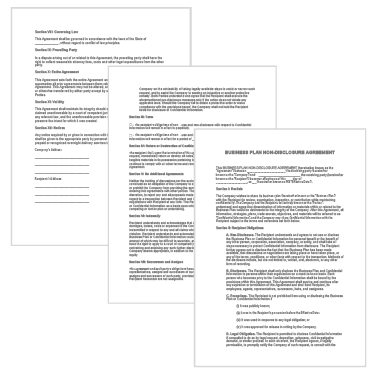
Free Checklist
Download and start using this template for:.
- To let your business plan readers sign NDA when sharing with consultants, investors, contractors, potential employees, and anyone else evaluating your planned enterprise.
- To protect confidentiality of your business plan
Download Your TEMPLATE Now
Ready to kickstart your business planning.
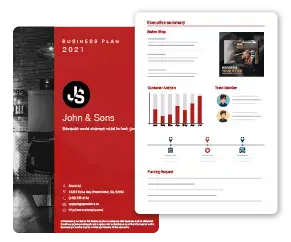
– Don’t Miss It
Business Plan Non-Disclosure Agreement (NDA)

The business plan non-disclosure agreement is intended for use when sharing a business plan with consultants, investors, contractors, potential employees, and anyone else evaluating your planned enterprise. Regardless of the size or complexity of your plan, it is likely to include confidential information that hopefully gives you an advantage over competitors. Such information could include your marketing plan, revenue forecast, and capital spending. Note, if you use an NDA with your business plan with one person, you must use NDAs for all who read it, and you should mark the plan as “confidential.”
Product Development NDA – Use when consulting with third (3rd) parties about a potential invention and its use and functionality.
BUSINESS PLAN NON-DISCLOSURE AGREEMENT This agreement (the “Agreement”) between _________________ (the “Disclosing Party”) and _________________ (the “Receiving Party”) is effective _________________ and is intended to prevent the unauthorized disclosure of Confidential Information (as defined below) contained in and relating to the business plan of Disclosing Party. The parties agree as follows: 1. Confidential Information “Confidential Information” is proprietary trade secret information contained within and relating to Disclosing Party’s business plan including but not limited to: business description, marketing plan, sales revenue forecast, profit and loss forecast, capital spending plan, cash flow forecast, future trends, personnel plan, business goals, personal financial statement, supporting documents and information conveyed in writing or in discussion that is indicated to be confidential. 2. Non-Disclosure Receiving Party will treat Confidential Information with the same degree of care and safeguards that it takes with its own Confidential Information, but in no event less than a reasonable degree of care. Without Disclosing Party’s prior written consent, Receiving Party will not: (a) disclose Confidential Information to any third party; (b) make or permit to be made copies or other reproductions of Confidential Information; or (c) make any commercial use of Confidential Information. Receiving Party will carefully restrict access to Confidential Information to those of its officers, directors and employees who are subject to non-disclosure restrictions at least as protective as those set forth in this Agreement and who clearly need such access to participate on Receiving Party’s behalf in the analysis and negotiation of a business relationship or any contract or agreement with Disclosing Party. Receiving Party will advise each officer, director or employee to whom it provides access to any Confidential Information that they are prohibited from using it or disclosing it to others without Disclosing Party’s prior written consent. 3. Return of Business Plan Materials Upon Disclosing Party’s request, Receiving Party shall within 30 days return all original materials provided by Disclosing Party and any copies, notes or other documents in Receiving Party’s possession pertaining to Confidential Information. 4. Exclusions This agreement does not apply to any information that: (a) was in Receiving Party’s possession or was known to Receiving Party, without an obligation to keep it confidential, before such information was disclosed to Receiving Party by Disclosing Party; (b) is or becomes public knowledge through a source other than Receiving Party and through no fault of Receiving Party; (c) is or becomes lawfully available to Receiving Party from a source other than Disclosing Party; or (d) is disclosed by Receiving Party with Disclosing Party’s prior written approval. 5. Term This Agreement and Receiving Party’s duty to hold Confidential Information in confidence shall remain in effect until _________________ or until whichever of the following occurs first: (a) Disclosing Party sends Receiving Party written notice releasing it from this Agreement, or (b) Confidential Information disclosed under this Agreement ceases to be a trade secret. 6. No Rights Granted This Agreement does not constitute a grant or an intention or commitment to grant any right, title or interest in Confidential Information to Receiving Party. 7. Warranty Disclosing Party warrants that it has the right to make the disclosures under this Agreement. 8. General Provisions (a) Relationships. Nothing contained in this Agreement shall be deemed to constitute either party a partner, joint venturer or employee of the other party for any purpose. (b) Severability. If a court finds any provision of this Agreement invalid or unenforceable, the remainder of this Agreement shall be interpreted so as best to effect the intent of the parties. (c) Integration. This Agreement expresses the complete understanding of the parties with respect to the subject matter and supersedes all prior proposals, agreements, representations and understandings. This Agreement may not be amended except in a writing signed by both parties. (d) Waiver. The failure to exercise any right provided in this Agreement shall not be a waiver of prior or subsequent rights. (e) Injunctive Relief. Any misappropriation of Confidential Information in violation of this Agreement may cause Disclosing Party irreparable harm, the amount of which may be difficult to ascertain, and therefore Receiving Party agrees that Disclosing Party shall have the right to apply to a court of competent jurisdiction for an order enjoining any such further misappropriation and for such other relief as Disclosing Party deems appropriate. This right of Disclosing Party is to be in addition to the remedies otherwise available to Disclosing Party. (f) Indemnity. Receiving Party agrees to indemnify Disclosing Party against any and all losses, damages, claims or expenses incurred or suffered by Disclosing Party as a result of Receiving Party’s breach of this Agreement. ( g) Attorney Fees and Expenses. In a dispute arising out of or related to this Agreement, the prevailing party shall have the right to collect from the other party its reasonable attorney fees and costs and necessary expenditures. (h) Governing Law. This Agreement shall be governed in accordance with the laws of the State of _________________. (i) Jurisdiction. The parties consent to the exclusive jurisdiction and venue of the federal and state courts located in _________________ in any action arising out of or relating to this Agreement. The parties waive any other venue to which either party might be entitled by domicile or otherwise. ( j) Successors & Assigns . This Agreement shall bind each party’s heirs, successors and assigns. Receiving Party may not assign or transfer its rights or obligations under this Agreement without the prior written consent of Disclosing Party. However, no consent is required for an assignment or transfer that occurs: (a) to an entity in which Receiving Party owns more than fifty percent of the assets; or (b) as part of a transfer of all or substantially all of the assets of Receiving Party to any party. Any assignment or transfer in violation of this section shall be void. Disclosing Party: _____________________________________________ (Signature) _____________________ (Typed or Printed Name) Title: _____________________ Date: _____________________ Receiving Party: _____________________________________________ (Signature) _____________________ (Typed or Printed Name) Title: _____________________ Date: _____________________
How to Write
EXPLANATION FOR BUSINESS PLAN NON-DISCLOSURE AGREEMENT
Below we provide an explanation for each of the provisions of the Business Plan Non-Disclosure Agreement.
Introductory Paragraph
Fill in your company name (you are the disclosing party). Fill in the name of the outside individual or company being granted access to your trade secrets (the Receiving Party). Finally, fill in the date the agreement will take effect. This can be the date it’s signed or a date in the future.
1. Confidential Information
This section defines what is protected against disclosure. Keep in mind that if you are disclosing information in conjunction with the plan, you should designate that information as confidential. If the information is spoken, you should announce the confidentiality.
2. Non-Disclosure
This clause makes clear that your trade secrets must be kept in confidence by the receiving party and may not be revealed to others without your prior written consent.
3. Return of Business Plan Materials
Here, the receiving party promises to return your business plan and related materials provided by your company, as well as copies, notes, and documents pertaining to the business plan. The agreement gives the receiving party 30 days to return the materials, but you can change this time period if you wish.
4. Exclusions
This provision describes all the types of information that are not covered by the agreement. These exclusions are based on court decisions and state trade secret laws that say these types of information do not qualify for trade secret protection.
This clause provides the receiving party with an expiration date for the agreement. The Agreement should last as long as the information is likely to remain a trade secret. Five years is a common period, but it can be much shorter, even as little as six months. In Internet and technology businesses, the time period may need to be shorter because of the fast pace of innovation.
6. No Rights Granted
This clause makes clear that you are not granting any ownership rights in the confidential information to the receiving party.
7. Warranty
A warranty is a promise. Here, you promise the receiving party that you have the right to disclose the information. This is intended to assure the receiving party that it won’t be sued by some third party claiming that the trade secrets belonged to it and that you had no right to reveal them to the receiving party.
8. General Provisions
These miscellaneous provisions (often referred to as “boilerplate”) are often grouped together at the end of an agreement.
Relationships . Most agreements include a provision like this one, disclaiming any relationship other than that defined in the agreement.
Severability . The severability clause provides that if you wind up in a lawsuit over the agreement and a court rules that one part of the agreement is invalid, that part can be cut out and the rest of the agreement will remain valid.
Integration . The integration provision verifies that the version you are signing is the final version and that neither of you can rely on statements made in the past.
Waiver . This provision states that even if you don’t promptly complain about a violation of the NDA, you still have the right to complain about it later.
Injunctive Relief . An injunction is a court order directing a person to do (or stop doing) something. If someone violated your NDA, you would want a court order directing that person to stop using your secrets.
Indemnity . Some NDAs require the receiving party to pay for all damages (lost profits, attorney fees or other expenses) incurred by the other party as a result of the receiving party’s breach of the non-disclosure agreement. This obligation is known as indemnification. Leaving out the indemnity provision does not prevent you from suing and collecting damages for a breach (contract law holds the receiving party responsible for a breach), but the clause makes it easier to claim damages.
Attorney Fees and Expenses. If you don’t include an attorney fees clause in your agreement, a judge may (in most states) order the award of attorney fees in cases where the theft of the trade secret was willful and malicious. It’s up to the judge, which makes things unpredictable. You are far better off using an attorney fees provision. However, don’t be surprised if the other party is opposed to the idea. Why? Because it is the receiving party that is usually sued, not vice-versa, and the receiving party may believe that the provision will encourage you to litigate.
Governing Law . You can choose any state’s laws to govern the agreement, regardless of where you live or where the agreement is signed. Most businesses favor the state where their headquarters are located.
Jurisdiction . The purpose of adding a jurisdiction provision to an NDA is to get each party to consent in advance to jurisdiction in one county or state and to give up the right to sue or be sued anywhere else.
Successors and Assigns . This provision binds any company that acquires either party.
Signing the agreement. Someone with the necessary authority must sign the agreement on behalf of each party. Each party should sign two copies and keep one. This way, both parties have an original signed agreement.
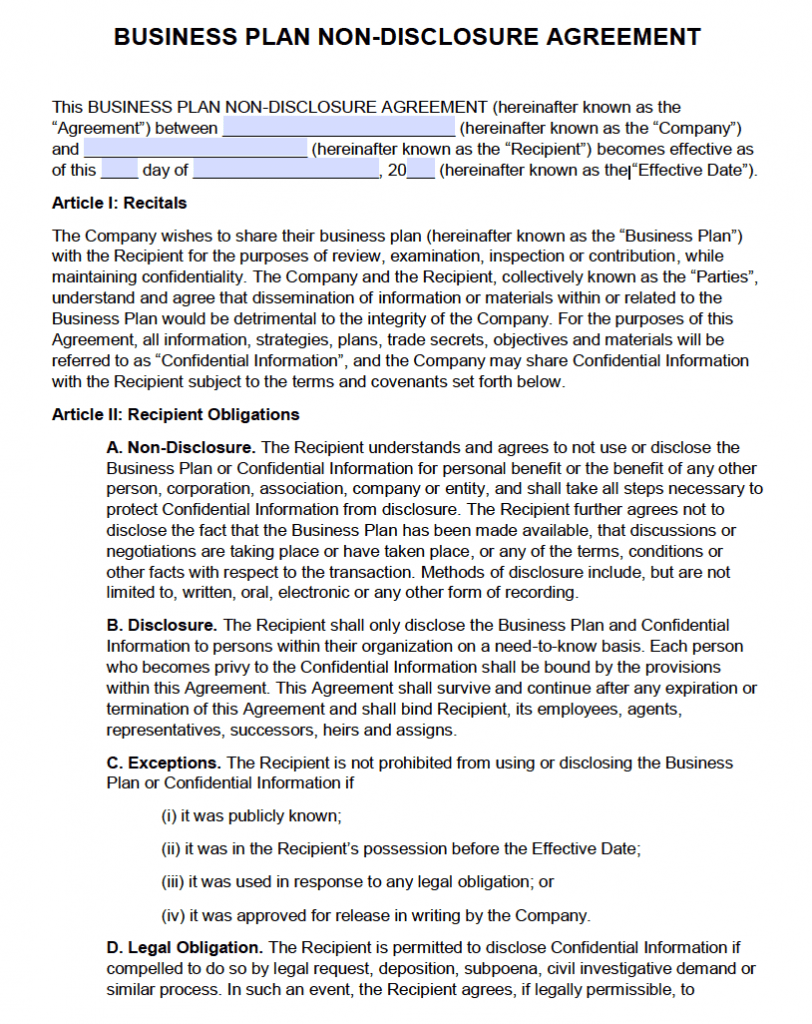
Adobe PDF – Microsoft Word (.docx)
Related NDA's:
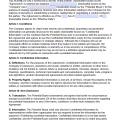
Thank you for downloading!
How would you rate your free form.
- Confidentiality Clause
Get free proposals from vetted lawyers in our marketplace.

Contract Clauses
- Acceleration Clause
- Arbitration Clause
- Assignment Clause
- Cancellation Clause
- Choice of Law Clause
- Consideration Clause
- Definitions Clause
- Dispute Resolution Clause
- Entire Agreement Clause
- Escalation Clause
- Exclusivity Clause
- Exculpatory Clause
- Force Majeure Clause
- Governing Law Clause
- Indemnification Clause
- Indemnity Clause
- Insurance Clause
- Integration Clause
- Merger Clause
- Non-Competition Clause
- Non-Disparagement Clause
- Non-Exclusivity Clause
- Non-Solicitation Clause
- Privacy Clause
- Release Clause
- Severability Clause
- Subordination Clause
- Subrogation Clause
- Survival Clause
- Termination Clause
- Time of Essence Clause
Jump to Section
Confidentiality clause defined.
Confidentiality clauses, also known as non-disclosure agreements, prevent the signing party from divulging sensitive information, personally identifiable information (PII), and trade secrets. These protections are for documents as well as verbal communications. Parties can negotiate the terms of the confidentiality clause according to scope and obligations as necessary.
This article also defines confidentiality clauses.
Confidentiality Explained
You can create one-sided or mutual confidentiality clauses. One-sided confidentiality clauses limit one party from disclosing any information about the other. In a mutual confidentiality clause, both parties must not reveal specific information about each other.
Here is another article that explains confidentiality clauses.
Purpose of a Confidentiality Clause
The purpose of a confidentiality clause is to protect a company from the disclosure of their trade secrets and sensitive information. For personal information to stay that way, there needs to be a confidentiality clause for documents and for email communications.
Regardless of the methods of communication, industry, or position, a confidentiality clause protects companies if they need to file a damages claim against someone who disclosed critical details to someone, whether they planned to exploit the information or not.
Confidentiality Clause Examples
Examples of confidentiality clauses include:
- Example 1: Preventing employees from talking to the press
- Example 2: Limiting the disclosure of on-site business practices
- Example 3: Stopping business partners from sharing IP rights
- Example 4: Agencies preventing models from divulging their strategies
- Example 5: Protecting a company when working with contractors
Confidentiality Clause Samples
Sample 1 – Employment Contract :
Confidential Information .
- Employee shall not, during the term of this Agreement or at any time thereafter, make unauthorized use of, or divulge to any other person or entity Company's trade secrets, confidential or other information as is described in Article 4, Section B, without prior written permission from Company's President. This Confidentiality Covenant shall apply to, but shall not be limited to all information protected under the Georgia Trade Secrets Act of 1990, and, in addition thereto, to all information described in Section B of this Paragraph and the protections provided to the Company under this Agreement shall be in addition to and not in lieu of the protections afforded under said Act.
- At all times during the term of this Agreement, and after its termination Employee shall take all reasonable precautions to protect the integrity of and shall refrain from any use or divulgence of Company's confidential information and trade secrets including, but not limited to: all files, tickler files, resource information, rolodex, records, documents, drawings, specifications, equipment, customer lists, supplier lists or information, product, supplier or customer catalogues, and similar items relating to the business of Company, or copies thereof, whether the originals or copies were prepared by Employee or otherwise came into Employee's possession.
- The confidential information and trade secrets described above shall remain the exclusive property of Company and shall not be removed from the premises of Company under any circumstances whatsoever without the express prior written consent of Company.
- If Employee breaches or threatens to breach this Article 4, Company shall be entitled to obtain injunctive relief containing such mandatory or prohibitory clauses as are necessary to prevent the continued breach of this covenant of confidentiality. Company shall also be entitled to any other remedies provided under this contract or at law. If Company elects to enforce this Paragraph through a court of law of appropriate jurisdiction, Employee shall be liable for payment of all court costs, attorney’s fees, and necessary expenditures, which Company incurs.
Reference :
Security Exchange Commission - Edgar Database, EX-10.6 3 ubi_ex10z6.htm EMPLOYMENT CONTRACT, Viewed April 5, 2021, < https://www.sec.gov/Archives/edgar/data/1320729/000137647415000176/ubi_ex10z6.htm >.
Sample 2 – Sale and Purchase Agreement :
Confidentiality . From and after the Closing Date, for a period of three (3) years after the Closing Date, Seller agrees and agrees to cause the Selling Affiliate, to treat all confidential data, reports, records, processes, know-how and other information it has developed or has in its control or possession relating to the Business, whether or not marked as confidential or proprietary (the “Information”), as confidential and to not disclose, discuss or reveal such Information to a third party without the prior written consent of Purchaser, unless Seller or the Selling Affiliate are required by applicable Law or order of a Government Authority to disclose any such Information and Seller or Selling Affiliate have informed Purchaser of such requirement and given Purchaser a reasonable opportunity to contest such requirement or to seek a protective order or a stay of such disclosure order. Seller agrees to exercise all reasonable efforts to avoid the disclosure of such Information to any third party. The obligations in this Section 7.08 shall not apply to any portion of the Information:
(a) which is or becomes, through no act or failure on Seller’s or the Selling Affiliate’s part, published information known on a non-confidential basis; or
(b) which corresponds in substance to information hereafter furnished to Seller or the Selling Affiliate by others as a matter of right without restriction on disclosure; or
(c) which is independently developed by or on behalf of Seller or the Selling Affiliate, without knowledge of the Information.
Security Exchange Commission - Edgar Database, EX-10.(I) 4 d230919dex10i.htm SALE AND PURCHASE AGREEMENT , Viewed April 5, 2021, < https://www.sec.gov/Archives/edgar/data/16040/000119312511324512/d230919dex10i.htm >.
Sample 3 – Master Sale Agreement :
Security Exchange Commission - Edgar Database, EX-10.33 5 dex1033.htm MASTER SALES AGREEMENT , Viewed April 5, 2021, < https://www.sec.gov/Archives/edgar/data/1350415/000119312506131362/dex1033.htm >.
Common Contracts with Confidentiality Clauses
Common contracts with confidentiality clauses include:
- Employment agreements
- Purchase agreements
- Business associate agreements
- Client services agreements
- Letters of representation
Confidentiality Clause FAQs
Confidentiality clauses carry legal implications for employees and employers alike. Avoid making legal mistakes. Check out the confidentiality clause FAQs below to learn more.
Are confidentiality clauses enforceable?
Confidentiality clauses are enforceable as long as they meet the elements of a contract. Exceptions to a waiver may apply. For instance, companies can’t enforce confidentiality clauses to protect public policy violations from discovery.

What should be in a confidentiality clause?
Confidentiality clauses can be as long or as short as necessary. A confidentiality clause should contain the following elements at a minimum to be enforceable:
- An agreement is made
- The other party accepts the agreement
- Both parties exchange consideration
You should also have parties sign and date the agreement. Speak with employment lawyers to help you draft, negotiate, and execute the legal particulars of a confidentiality clause.
Jeremiah C.
Meet some of our Lawyers
Keren E. Gesund has extensive litigation expense. She has successfully defended and prosecuted claims against debt collectors, banks, credit reporting agencies, subcontractors, manufacturers and consumers who have suffered harassment or injury. She handles contentious business and commercial cases for both plaintiffs and defendants in state and federal court.
Attorney with 10 years experience focusing on corporate transactions and formations, real estate, and estate planning.
I have been practicing law for 18 years. I have worked in a mid-size firm environment where I was named a partner in 2014. In 2016, I left to start my own practice and work part-time. I handle most all corporate and transactional work and serve has outside general counsel for a number of companies
Graduated from Washburn University School of Law with certificates in Tax Law and Business Transactions. Served as a specialized tax advisor and business consultant to clients across the nation over the last 8 years. I have practiced law since 2019, specializing in entity formations, contract drafting, contract review, contract disputes, business transactions, demand letters, legal research, and general business consulting.
Matt is a licensed attorney based out of Dallas, Texas. Despite having recently graduated, Matt has been immersed in the world of Corporate law throughout law school and beyond. As a result, he has benefitted from the unique and advantageous position of experiencing and working on a wide array of matters, such as reviewing, drafting and negotiating contracts, overseeing regulatory compliance, business formation, risk management, and much more. Contact Matt today for a free consultation!
I have practiced law for more than 35 years in the State of Texas. I am proud of the relationships I have formed with my clients and the high level of legal advice I have provided over these many years. I am responsive and will promptly address your particular situation. For 35 years I have counseled individuals, partnerships and corporations with regard to business formation, real estate transactions and issues, employer/employee relationships, contracts, estate planning and asset protection. I am licensed to practice law in all state courts in Texas and all federal courts. I have represented plaintiffs and defendants throughout the state in cases ranging from contract disputes to injury claims. I have worked with every type of business you can imagine from individuals to "mom and pop" businesses and businesses with assets of more than $10,000,000. My clients' businesses range from large construction contractors, investment companies, oil and gas companies, and commercial landlords, to name a few.
Find the best lawyer for your project
Contract lawyers by city.
- Atlanta Contract Lawyers
- Austin Contract Lawyers
- Boston Contract Lawyers
- Chicago Contract Lawyers
- Dallas Contract Lawyers
- Denver Contract Lawyers
- Fort Lauderdale Contract Lawyers
- Houston Contract Lawyers
- Las Vegas Contract Lawyers
- Los Angeles Contract Lawyers
- Memphis Contract Lawyers
- Miami Contract Lawyers
- New York Contract Lawyers
- Oklahoma City Contract Lawyers
- Orlando Contract Lawyers
- Philadelphia Contract Lawyers
- Phoenix Contract Lawyers
- Richmond Contract Lawyers
- Salt Lake City Contract Lawyers
- San Antonio Contract Lawyers
- San Diego Contract Lawyers
- San Francisco Contract Lawyers
- Seattle Contract Lawyers
- Tampa Contract Lawyers

Quick, user friendly and one of the better ways I've come across to get ahold of lawyers willing to take new clients.
Contracts Counsel was incredibly helpful and easy to use. I submitted a project for a lawyer's help within a day I had received over 6 proposals from qualified lawyers. I submitted a bid that works best for my business and we went forward with the project.
I never knew how difficult it was to obtain representation or a lawyer, and ContractsCounsel was EXACTLY the type of service I was hoping for when I was in a pinch. Working with their service was efficient, effective and made me feel in control. Thank you so much and should I ever need attorney services down the road, I'll certainly be a repeat customer.
I got 5 bids within 24h of posting my project. I choose the person who provided the most detailed and relevant intro letter, highlighting their experience relevant to my project. I am very satisfied with the outcome and quality of the two agreements that were produced, they actually far exceed my expectations.
How It Works
Post Your Project
Get Free Bids to Compare
Hire Your Lawyer
Find lawyers and attorneys by city
Notices and Disclaimers for Your Business Plan
Determine any legal requirements that pertain to your location and business., business plan disclaimers.
SmallBusinessPlans.com is not a law firm and does not give legal advice. This section is intended to highlight areas you should review with an individual licensed to practice law in your state.
When you are raising capital or seeking another form of capital, it’s important to pay attention to legal requirements, which vary by state. It would not be uncommon for a lender or investor to want to include your business plan as part of a contractual agreement between the parties. Because a business plan is focused on what the entrepreneurs expect to happen, certain legal disclaimers should be included. While the types of disclaimers on this page may be helpful, you should consult an attorney for specific advice for your business plan in your state.
List of Disclaimers for Your Business Plan
- Confidentiality Statement
- Notice of Forward-Looking Statements
- Significant Risks
- Notice that the Business Plan is Not an Offer to Sell or a Solicitation for Securities
- Testimonial Disclaimer (if your business plan includes testimonials)
Intellectual Property Disclaimer
- Other Notices and Disclaimers Advised by Your Attorney
The disclaimer examples found in almost all business plans include those noted above, but this list is by no means exhaustive. You should ask your legal advisors about the need for these and any other disclaimers and notices for your state and type of business. Your legal advisors will also be able to provide you with specific language that should be used for each type of notice or disclaimer. They may also provide you with an umbrella disclaimer statement, or risk disclaimer appropriate for your location and industry.
Confidentiality Statement.
Every business plan should be marked “CONFIDENTIAL.” We recommend including your confidentiality notice in a footer on every page of your business plan.
Notice of Forward-Looking Statements.
Your business plan will include information about things that have already happened and things you expect to happen. Discuss with your legal advisors the appropriate language to put readers on notice that the business plan includes “forward looking statements,” or statements about things you expect to happen.
Significant Risks.
Explicitly address that there are significant risks associated with the business plan. For this section, you should separate your enthusiasm for the business and focus only on managing any personal liability, by disclosing significant risks. These typically include competitive risks, risks due to the economy, failure of significant sales expectations to materialize, the health and well-being of a few key individuals, and availability of raw materials. Lenders and investors will have seen these dire warnings on dozens or even hundreds of business plans.
Not an Offer to Sell or a Solicitation for Securities.
There are strict state and federal laws governing the sale of ownership (stock, equity) even in a small business. A business plan is not intended to be an offer to sell ownership; rather, it is a document designed to gain interest in the business. An offer to sell ownership in your company must be done thorough a separate document, typically a Prospectus or Private Placement Memorandum. Your disclaimers should make this clear, using the legal language required or advised in your state.
Testimonial Disclaimer
A testimonial disclaimer is a statement that is included when presenting testimonials from customers or clients in advertising or promotional materials. The purpose of a testimonial disclaimer is to provide transparency and to disclose any potential biases in the testimonials that are being presented. A testimonial disclaimer may include information such as:
- The testimonial is from a real customer, but the results may not be typical.
- The testimonial is based on the customer’s individual experience and may not be representative of what other customers may experience.
- The testimonial is not a guarantee or prediction of future performance.
- The company providing the testimonial may have compensated the customer for their testimonial or provided them with an incentive to provide a testimonial.
The goal of a testimonial disclaimer is to make it clear that the testimonial is only one person’s experience and not a guarantee of future performance.
An intellectual property (IP) disclaimer is a statement that is used to clarify the ownership and use of any intellectual property (such as trademarks, copyrights, and patents) that is included in a document, website, or other materials. The purpose of an IP disclaimer is to protect the rights of the owner of the IP and to inform others of the terms of use for the IP.
An IP disclaimer may include information such as:
- The IP is owned by a specific individual or company and is protected by intellectual property laws.
- The IP may only be used with the permission of the owner or under the terms of a specific license agreement.
- The IP should not be used in a way that implies endorsement or sponsorship by the owner.
- The IP should not be used in a way that infringes on the rights of the owner.
The goal of an IP disclaimer is to make it clear that the owner of the IP holds specific rights to it and others should not use it without permission, or in a way that infringes on those rights. It also makes it clear that the use of the IP does not imply any kind of sponsorship or endorsement from the owner. It is important for creators and holders of IP to be aware of the rights they have and to protect them.
Other Notices Advised by Your Legal Advisor.
Consult with your attorney on these and other notices and disclaimers required or recommended in your state, for your type of business.
What is the Value of Providing Disclaimers in Your Business Plan?
Including disclaimers in a business plan can provide legal protection for the author and any potential investors by clearly stating any limitations or qualifications of the information presented. They can also help to manage expectations by highlighting any potential risks or uncertainties associated with the venture. Additionally, including a disclaimer can demonstrate that the author has taken steps to be transparent and has considered potential legal issues related to the proposed venture.
Do Disclaimers Give Complete Protection from Legal Liability?
Including a legal disclaimer in a business plan may provide some protection against liability from lenders or investors, but it is not a guarantee. Disclaimers can help to manage expectations by highlighting any potential risks or uncertainties associated with the venture, and by making it clear that the information presented is subject to change. However, it’s important to note that a disclaimer does not absolve an author or any other party from their legal liability or potential claims. A disclaimer can also not protect you from any fraud or intentional mispresentation. It’s always best to consult with legal professionals to better understand the potential liabilities and legal obligations that may arise from a business plan, and how a disclaimer may or may not provide protection.
Ready to complete your business plan in just 1 day?
Click GET STARTED to learn more about our fill-in-the-blank business plan template. We’ll step you through all the details you need to develop a professional business plan in just one day!
Successfully used by thousands of people starting a business and writing a business plan. It will work for you too!
All Formats
12+ Business Confidentiality Agreement Templates – Free Sample, Example Format Download
In a business organization, there exist a lot of secrets which could be the formulae for developing their products, details of the employees, various strategies for the betterment of the business etc. Most of the people who come in contact with the organization may have some idea about this. You may also see agreement templates .

- 330+ Agreement Templates in Word
- 27+ Confidentiality Templates
Agreement Template Bundle

- Google Docs
Business Agreement Template Bundle

Business Confidentiality Agreement
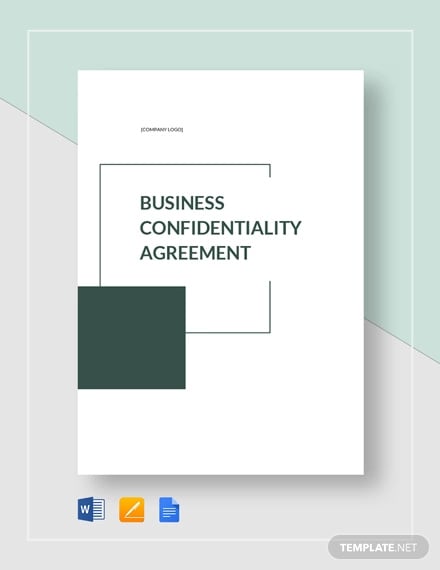
Business Financial Confidentiality Agreement
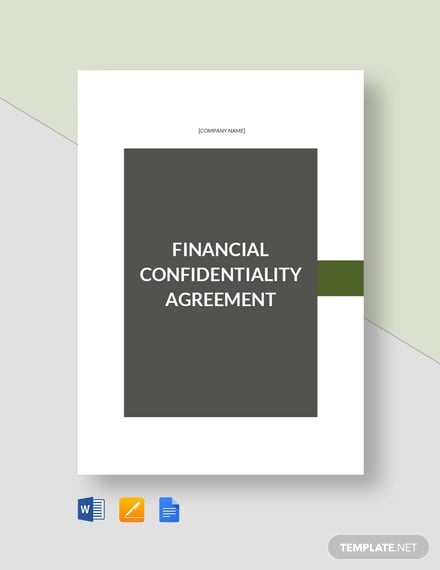
Business Meeting Confidentiality Agreement Template
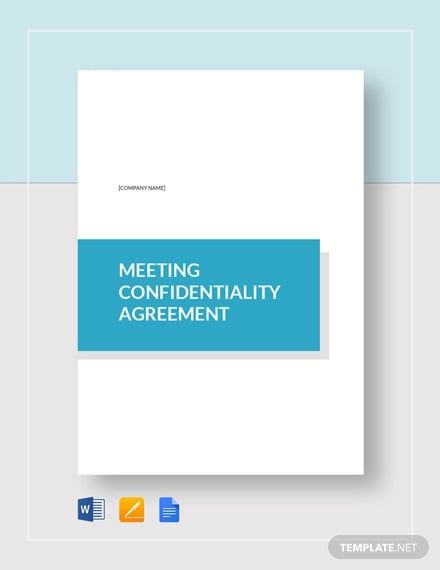
Restaurant Confidentiality Agreement Template
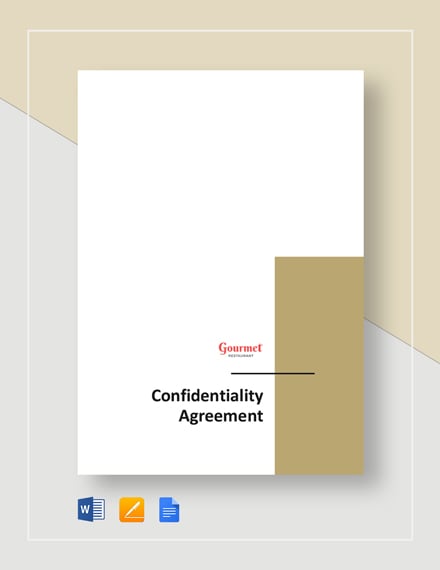
Example Financial Business Confidentiality Agreement
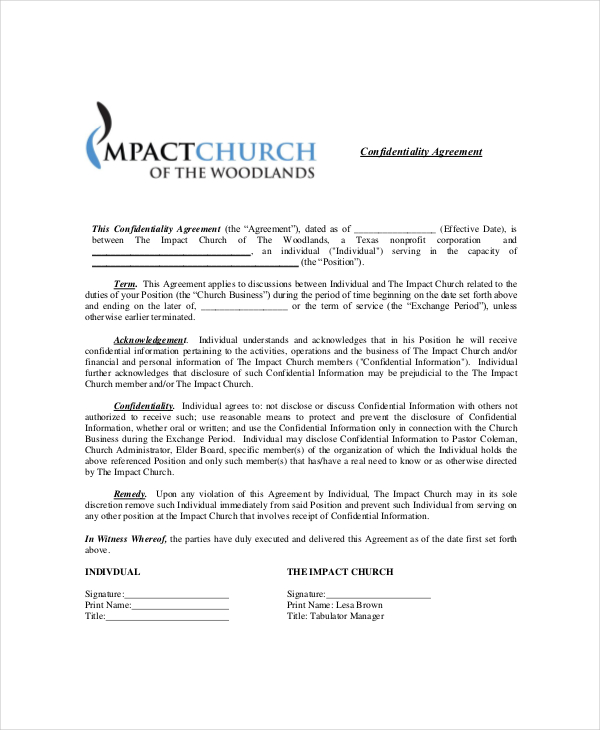
Sample Mutual Business Confidentiality Agreement
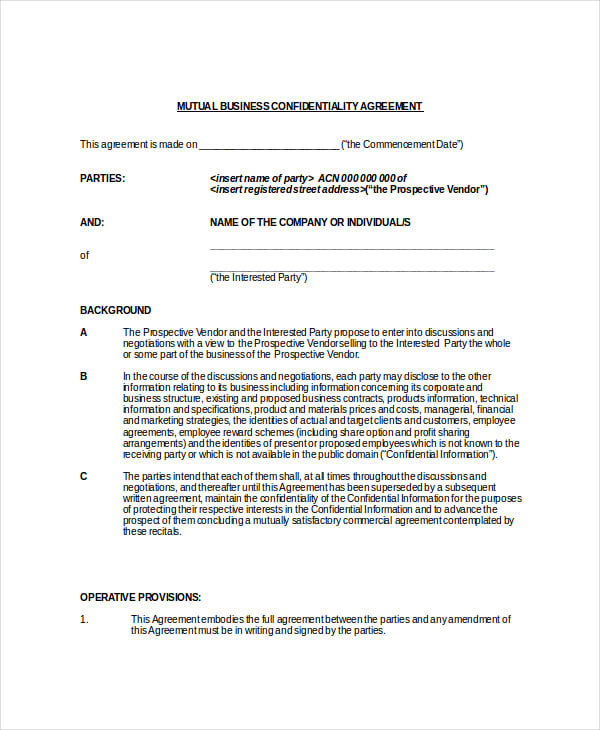
- Word (2003 or Higher)
Generic Example Business Confidentiality Agreement
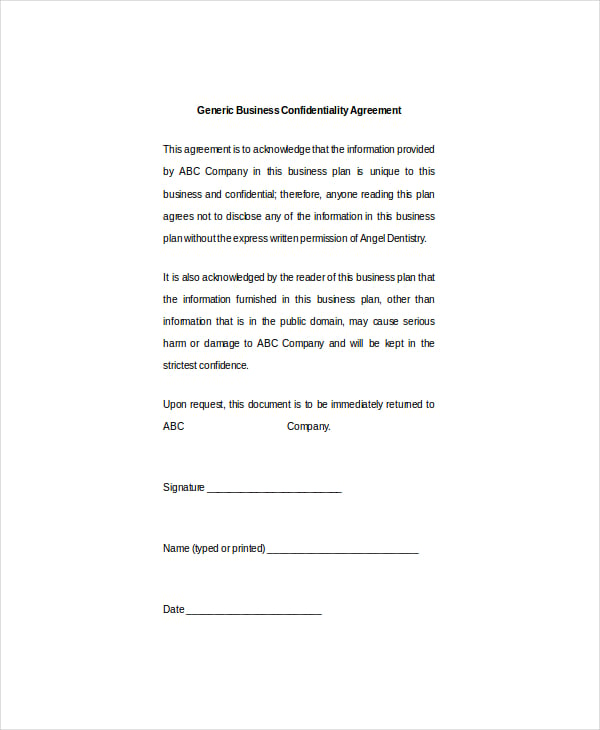
Sample Business Confidentiality Unilateral Agreement
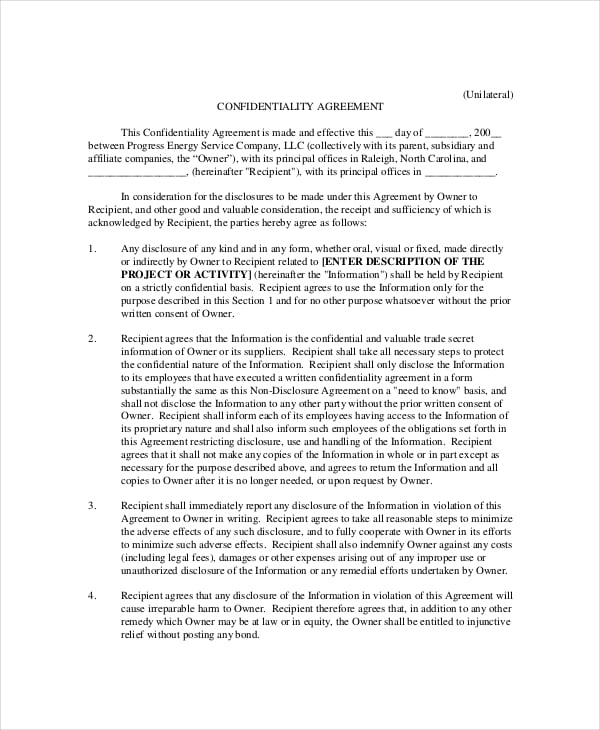
Example Business Confidentiality Agreement Form
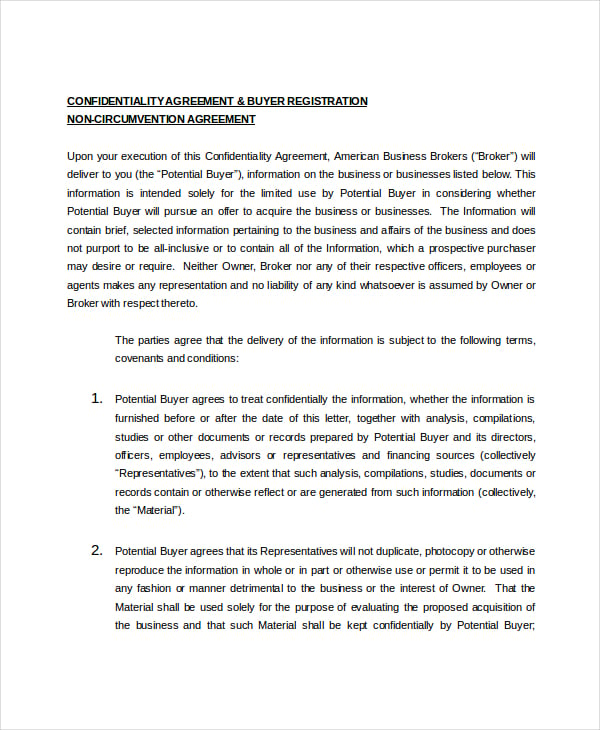
Business Plan Sample Confidentiality Agreement
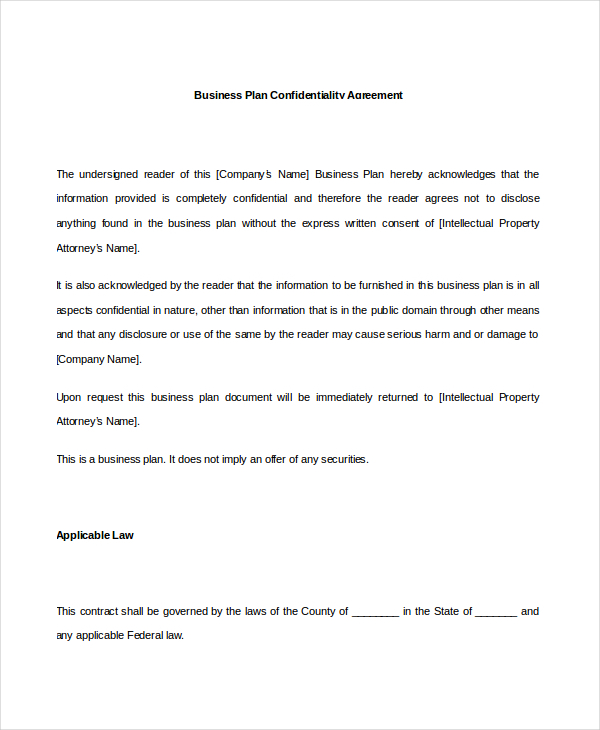
Example Business Non Disclosure Confidentiality Agreement
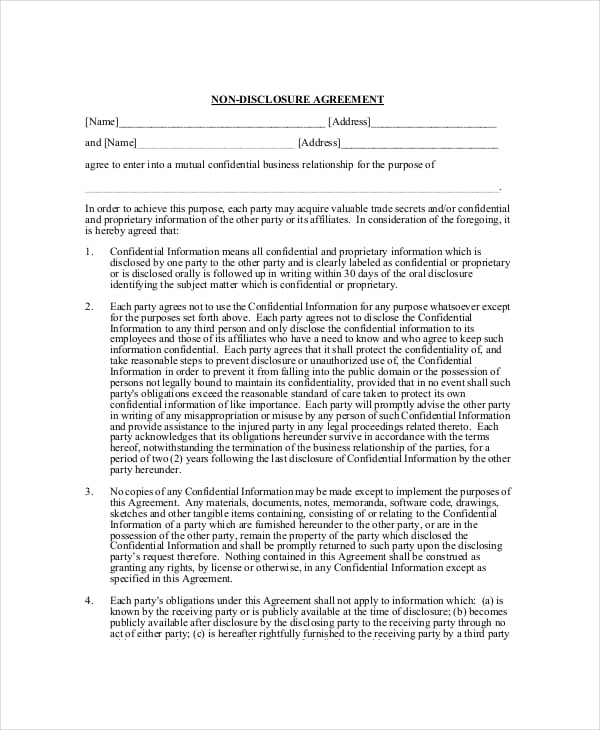
Sample Business Contract Disclosure Agreement
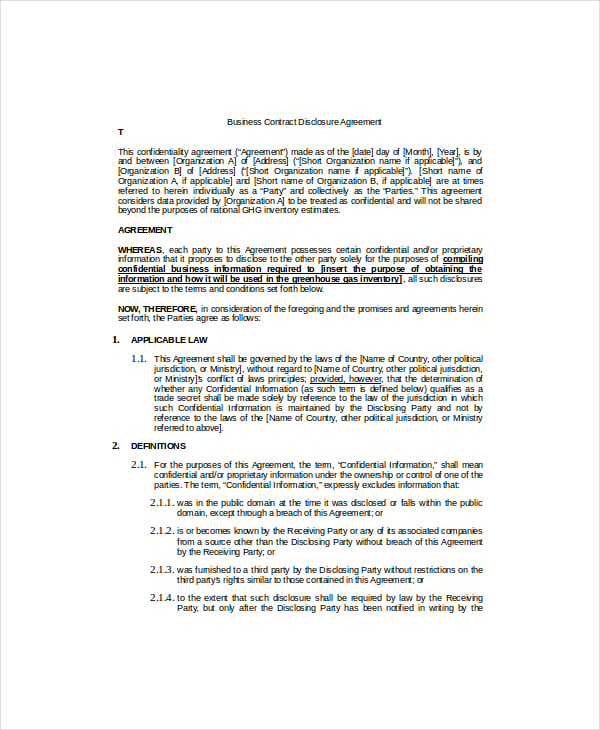
Example Precedent Business Confidentiality Agreement
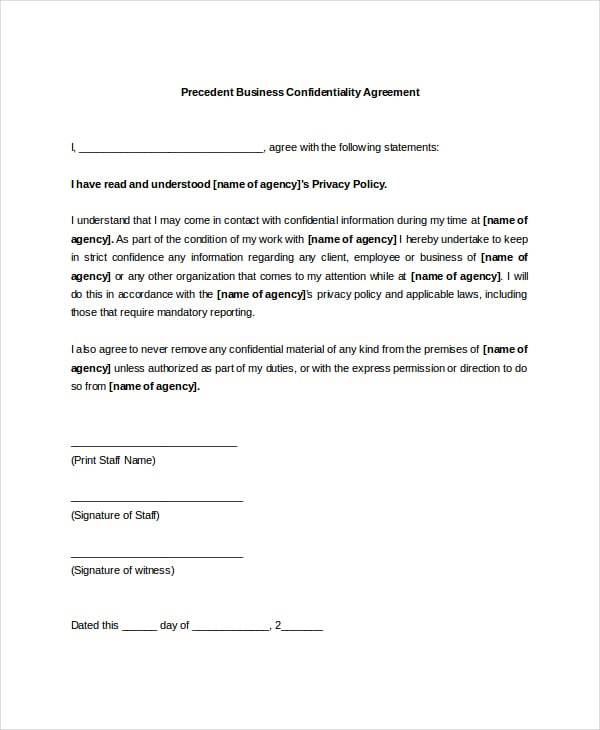
> Uses of Business Confidentiality Agreement
- For the employees to safeguard the company secrets
- For the financial institutions to protect the financial details of a company
- For vendors to ensure certain company information is safe
- For two or more parties planning to merge their business
> Benefits of Business Confidentiality Agreement
- It can be drafted as per the requirement and preference of the business organization
- The agreement spells out all the information clearly, thus ensuring that there is no confusion as to what is considered confidential
- It warns the signing party about the consequences in case there is a breach of the agreement
- Considered to be a valid proof in the court of law, it can be helpful in case of a dispute
> How to Draft a Business Confidentiality Agreement
More in agreements, business card template, professional business card template, business card background template, digital marketing agency creative business card template, metro dark corporate business card template, luxury real estate business card template, simple ceo business card template, logistics services business card template, law business card template, sample real estate business card template.
- 44+ Simple Rental Agreement Templates – PDF, Word
- 33+ Purchase and Sale Agreement Templates in MS Word | PDF | Apple Pages | Google Docs
- 41+ Best Tenancy Agreement Templates
- 21+ Payment Agreement Templates in Google Docs | Pages | MS Word | PDF
- 11+ Recruitment Agency Service Level Agreement Templates in PDF | MS Word
- 5+ Retained Search Agreement Templates in PDF
- 15+ Recruitment Agreement Templates in PDF | MS Word | Google Docs | Apple Pages |
- 11+ Logistics Service Agreement Templates in PDF | MS Word
- 10+ Recruitment Services Agreement Template in PDF | MS Word
- 11+ Logistics Agreement Templates in Google Docs | MS Word | Pages | PDF
- 28+ Simple Tenancy Agreement Templates – PDF
- 9+ Retirement Agreement Templates in Google Docs | Word | Pages | PDF
- 12+ Divorce Agreement Templates
- 27+ Simple Rental Agreement Templates – Free Sample, Example Format Download
- 16+ Memorandum of Agreement Templates – PDF, DOC
File Formats
Word templates, google docs templates, excel templates, powerpoint templates, google sheets templates, google slides templates, pdf templates, publisher templates, psd templates, indesign templates, illustrator templates, pages templates, keynote templates, numbers templates, outlook templates.

IMAGES
VIDEO
COMMENTS
To write a stringent confidentiality statement for your business plan, these are the elements that you must include: 1. Date of Effect. The date of effect is the date from which the confidentiality statement becomes active. An agreement is not valid until all the parties sign it; the date of effect follows this. 2.
Here are a few examples of business plan confidentiality statements that you can use as references or templates for drafting your own business plan confidentiality agreement: Simple Business Plan Confidentiality Statement: "This business plan and the information contained herein are confidential and proprietary to [Company Name].
Business Plan Confidentiality Agreement: The undersigned reader of [Company's Name] Business Plan hereby acknowledges that the information provided is completely confidential and therefore the reader agrees not to disclose anything found in the business plan without the express written consent of [Business Owner's Name].
☐ 'Business Operations' which includes all processes, proprietary information or data, ideas or the like, either in existence or contemplated related to Disclosing Party's daily and long-term plans for conducting Disclosing Party's business. ☐ 'Computer Technology' which includes all computer hardware, software or other tangible and
A. Use the proper contract format. The proper contract format that is generally used when writing a confidentiality statement is the standard contract format. In this writing format, single-spaced paragraphs with a double space between them is used. Each paragraph constitutes a separate term of the contract and are also numbered for ...
A confidentiality agreement—also called a "nondisclosure agreement" or "NDA"—is a legally binding contract where a person or business promises to treat specific information as a trade secret and promises not to disclose the secret to others without proper authorization. NDAs are sometimes used in other civil cases, such as where one party ...
Unilateral confidentiality agreement: This information is protected when one party discloses the information and the other party receives the information and agrees to keep it confidential. These are the things that need to be included in the confidentiality agreement that you drafted. Receiving and Disclosing Parties: If either of the parties ...
Create Document. Updated December 22, 2022. A business plan non-disclosure agreement (NDA) allows someone to share a business plan without fear of a third party using it for their own benefit. Business plans are highly confidential, especially detailing a marketing strategy with a different approach to a specific market. An NDA makes the shared ...
A business plan non-disclosure agreement is a document intended to protect private information about your business plan.It notifies the other party that you intend to share confidential information. It lays out potential penalties that the other entity, often a company or a potential business partner, will have to pay if they disclose information about your business plan.
A business confidentiality statement is a tool that businesses use when they discuss their business plan with others who will be given information that the company values or wishes to keep a secret. In essence, it is a document that states that when a company's business plan is seen, they will not be able to discuss the contents of it with ...
A confidentiality statement, also referred to as a non-disclosure agreement or NDA, is a legally enforceable contract that establishes confidentiality between two parties, i.e., the party disclosing the protected information and the recipient of that information. A confidentiality statement can be used to prevent disclosure of confidential ...
Download And Start Using This Template For: To let your business plan readers sign NDA when sharing with consultants, investors, contractors, potential employees, and anyone else evaluating your planned enterprise. To protect confidentiality of your business plan.
Fill Now Download PDF (282.57 KB) Download Word (22.29 KB) The business plan non-disclosure agreement is intended for use when sharing a business plan with consultants, investors, contractors, potential employees, and anyone else evaluating your planned enterprise. Regardless of the size or complexity of your plan, it is likely to include ...
Confidentiality Clause Examples. Examples of confidentiality clauses include: Example 1: Preventing employees from talking to the press. Example 2: Limiting the disclosure of on-site business practices. Example 3: Stopping business partners from sharing IP rights. Example 4: Agencies preventing models from divulging their strategies.
Get PDF. A business confidentiality agreement form (or non-disclosure agreement) is a legally binding contract that an individual, or enterprise, must sign when handling specific information as a commerce secret. Additionally, both need to pledge to never disclose any information to someone else without the proper authorization.
A confidentiality statement acts as legal binding between two or more parties who have partnered with each other. In this article, we have provided few examples of confidentiality statement. Confidentiality statements, also known as non-disclosure agreements, are contracts which are prepared to safeguard the interests of an individual/company.
A confidentiality agreement is a contract between two or more parties regulating the treatment of specified private information. While these agreements can exist in a variety of contexts, they are ...
List of Disclaimers for Your Business Plan. Confidentiality Statement. Notice of Forward-Looking Statements. Significant Risks. Notice that the Business Plan is Not an Offer to Sell or a Solicitation for Securities. Testimonial Disclaimer (if your business plan includes testimonials) Intellectual Property Disclaimer.
The confidentiality statement is a legally binding document requiring the parties not to share information. These agreements are used between two companies, between an employee and company, or between a contractor and a company to ensure that trade secrets and competitive information remain private. Confidentiality statements are also referred ...
Business Plan Confidentiality Agreement The undersigned reader of [Company's Name] Business Plan hereby acknowledges that the information provided is completely confidential and therefore the reader…
A. Use the proper contract format. The proper contract format that is generally used when writing a confidentiality statement is the standard contract format. In this writing format, single-spaced paragraphs with a double space between them is used. Each paragraph constitutes a separate term of the contract and are also numbered for specification.
Size: 39.9 KB. Download Now. Most of the employees who work in an organization are privy to some of their important secrets which would otherwise be hidden from the outside world. These employees are expected to sign a business confidentiality agreement to ensure that the safe keep of the company secrets.
A sample confidentiality statement for business is a document that outlines the terms and conditions of maintaining confidentiality and protecting sensitive information within a business setting. It serves as a legally binding agreement between the company and its employees, clients, or partners, ensuring that confidential information is ...
A 70-year-old man died after flooding swept away his vehicle in the UAE's Ras Al-Khaimah, a police statement said on Tuesday. The rainfall continued to shift east Wednesday, impacting parts of ...